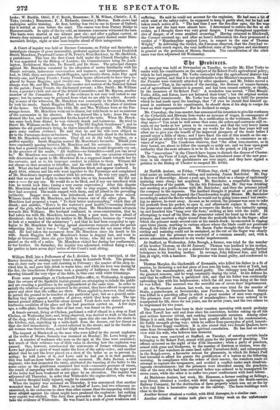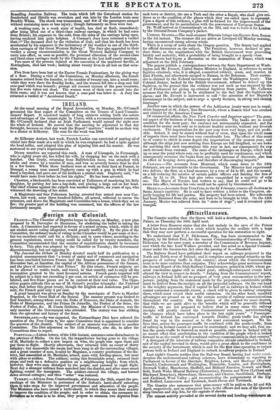ebe Vrobinces.
A meeting was held at Newmarket on Tuesday, to enable Mr. Eliot Yorke to confer with his constituents on the subject of Sir Robert Peel's agricultural policy; which he had supported. Mr. Yorke contended that the agricultural distress has only been partial, and that it is not attributable to the Minister's measures. Be and the Premier were violently attacked by other speakers; and Mr. Dobito moved a resolution—" That, in the opinion of the meeting, the distress of tenant-farmers and of agricultural labourers is _general, and has been caused entirely, or chiefly, by the measures of Sir Robert Peel." A resolution was moved, "That Messrs. orke, Affix, and Eaton, have not betrayed their trust"; but the original motion was affirmed unanimously. Mr. Yorke was then called upon to fulfil the promise which he had made upon the hustings, that "if ever he should find himself op- posed in sentiment to his constituents, he should deem it his duty to resign his trust as their representative." But he declined to resign.
Mr. Crawshay, the iron-master, has announced his intention to give his workmen- of the Cyfarthfa and Hirwain Iron-works an increase of wages, m consequence of the improved state of the iron-trade. In a notification to the workmen, Mr. Craw- shay says—" You must be well aware that some old orders and contracts still re- main on my books at low prices to be executed, and that the very heavy losses which I have sustained in carrying on my works :for the last four years will not allow me to give you the benefit of the improved prospects of the trade before I myself enjoy a little of them; and I have fixed the end of this month as the ear- liest period at which it will be mutually fair and reasonable to commence an ad- vance of wages." The Cambrian observes, that "the other iron-masters, as in. duty bound, are about to follow the example so nobly set; and we hear upon good. authority that the next advance is to be 2s. 6d. in the pound, or 12i per cent.
The " innovations " in the Church have begun to disturb the diocese of Chester. Mr. Irvine, the Vicar of Leigh, near Bolton, has introduced some of the new prac- tices in his church: the parishioners are very angry, and they have signed a. petition to the Bishop of Chester to suspend Mr. Irvine.
At Norfolk Assizes, on Friday, "William Day, clerk," aged thirty-three, was tried under an indictment for cutting and maiming James Batchelor. Mr. Day is Rector of Havrtridge. About a year ago, he was tried on a charge of maliciously maiming some sheep; but acquitted. Mr. Batchelor, a respectable farmer, is Churchwarden of the parish. On the 5th February last, Mr. Day was drinking and smoking at a public-house with Mr. Batchelor; and then the prisoner joined the company in the taproom. The landlord thought it prudent to get rid of his reverend customer, but deputed the Churchwarden to play Mentor. Mr. Batchelor accordingly asked the Rector whether he would not be going home soon? but receiv- ing no answer, he went away. As soon as he retired, the prisoner was seen to take his penknife from his pocket, to open it, and afterwards replace it. Soon after, the prosecutor made another attempt to remove the Rector; who instantly sprang up and knocked him "bang over the form," striking at him with the knife. In attempting to ward off the blow, the prosecutor raised his hand up to that of the prisoner, and received a slight wound from the penknife-blade in the finger; after which the prisoner made several cuts at his smock-frock: he succeeded in ripping open three places, marking in various others where the-blade could not penetrate tough the folds of the garment Mr. Baron Parke thought that the charge for cutting and maiming could not be sustained, as the cnt on the WaS clearly accidental: but the prisoner was convicted of a common assault; and, with a. severe admonition, sentenced to six weeks' imprisonment.
At Stafford, on Wednesday, John Brough, a farmer, was tried for the murder of his brother Thomas, on the 3d January. Thomas was landlord to his mother, with whom John lived: he put a distress for rent into the house, refusing further indulgence to his kneeling mother. In revenge, John followed him, and killed him at night, with a hammer. The prisoner was found guilty, and condemned to death.
Thomas Marples, the blacksmith of Grenaaide, who killed his father in a fit of passion, by thrusting a red-hot piece of iron into his body, was tried at York, last week, for the manslaughter, and found guilty. The unhappy man had suffered' the greatest remorse, and he wept constantly during the trial. In his defence he. said that he suffered from a paralyzed side, and that his father was continually upbraiding him with his helplessness; which the old man was doing at the time he was killed. The sentence was the merciful one of seven days' imprisonment.
At the Worcester Assizes, last week, ten men were tried for the murder of
Staite, a gamekeeper, at Severnstoke, near Pershore, in December last. Smitewas killed in a poaching affray in which a great number of men were engaged.
The prisoners were all found guilty of manslaughter: four were ordered to be transported for life, three for ten years, one for seven years, and the two others ta. be imprisoned for two years.
The reporters have been busy in their vocation narrating with much pro all that Tawell has said and done since his conviction, besides raking up all his past actions however trivial, and making innumerable surmises. Among other things it is said, that the culprit has been greatly affected by his condemnation, his bodily strength giving way; while he suffers from paroxysms of grief, lament- ing his former happy condition. It is also stated that two female Quakers have come from Devonshire to afford him spiritual consolation. He has had an inter- view with his wife, who believes him innocent.
Two men were convicted at Stafford, on Tuesday, of entering certain lands belonging to Sir Robert Peel, armed with guns for the purpose of poaching. The offence occurred on the night of the 27th December; when a party of poachers, armed with guns and bludgeons, to the number of fourteen or sixteen, were dis - covered by four watchers on some land called Turnabout-field; and subsequently in the Rough-cover a favourite retreat for pheasants, in which Sir Robert Peel had intended to afford his guests the gratification of a battue on the following morning. In compliance with the orders of their master, the watchers made no attempt to capture the trespassers, and avoided a conflict under such disadvan- tageous circumstances: but the prisoners were identified among the poachers. One of the men who had been convicted before was ordered to be transported for seven years, while the other is to suffer two years' confinement with hard, labour.
At Maidstone Assizes, last week, Mr. Hammon, a farmer residing at Sellinge near Dover, obtained a verdict, with 8001- damages, against the South-eastern. Railway Company, for the destruction of farm property which was set on fire by a live coal from a locomotive engine on the railway. The farm-buildings were close to the line. Another farmer obtained a verdict, with 8941. damages, in a similar case.
Another collision of trains took place on Friday week on the unfortunate Brandling Junction Railway. The train which left the Gateshead station for Sunderland and Shields was overtaken and run into by the London train near Brockly Whins. The shock was tremendous, and few of the passengers escaped without sustaining more or less injury; though fortunately no lives were lost.
A working man, in a weak state of health, has died at Bath, immediately after being -lifted out of a third-class railway carriage, in which he had come from Bnstol; bis exposure to the cold, from the sides of the carriage being open, having rendered him quite helpless. A Coroner's Jury have returned a verdict that—" The deceased died by the visitation of God; and that his death has been accelerated by his exposure to the inclemency of the weather in one of the third- class carriages of the Great Western Railway." The Jury also appended to their verdict a strong recommendation to the Great Western Railway Company to carry into effect, as soon as possible, the promised alteration of the second-class and third-class carriages made by the Chairman at the last half-yearly meeting.
Two more of the persons injured at the execution of the murderer Saville, at Nottingham, died last week; making about twenty lives in all lost on that occa- Bien.
Five lives have been lost at the Exeter Female Penitentiary., by the giving way of a floor. Daring a visit of the Committee, on Monday afternoon, the female inmates retired from the laundry, to the number of twenty-one, into a small room; while they were there the flooring broke, and the women fell into a deep and full cess-pool which was beneath: prompt aid rescued sixteen of the poor creatures, but five were taken out dead. The women went of their own accord into the little room; and it was not know n that a cess-pool was below it. A Jury has returned a verdict of "Accidental Death."



























 Previous page
Previous page